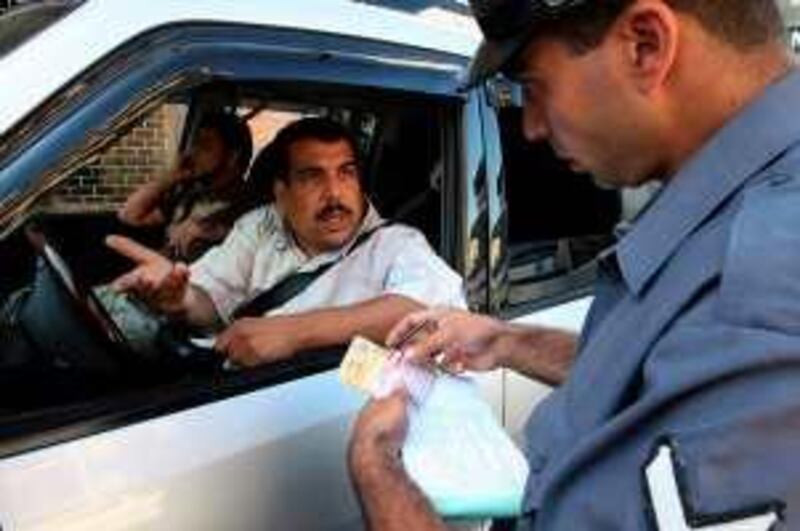BEIRUT // As the newly installed Lebanese cabinet debates a ministerial statement on the roll of Hizbollah and its weapons in the fight against Israel, the group has acted in recent days to address its reputation as maintaining a state within a state in Lebanon by allowing law enforcement into the southern suburbs it controls.
After a series of meetings between Hizbollah officials, including its top security official, Wafiq Safa, and Lebanon's interior minister, Ziad Baroud, and the head of the Internal Security Forces (ISF), Ashraf Rifi, the group agreed to allow about 30 traffic policemen into the southern suburbs, known in Arabic as "al Dahiya", to issue tickets and check registration of vehicles, a job that had been run by Hizbollah's security wing for the past five years.
In addition to agreeing to allow the traffic police to enter their strongholds, Hizbollah also vowed to co-operate with the ISF in searching for wanted criminals thought to be located in their areas. Mr Baroud told the pan-Arab newspaper al Hayat that he expects the co-operation to increase and that a mechanism for co-ordinating arrests and sweeps with Hizbollah was being established with the group's full commitment.
Mr Baroud told the paper that there will be "more security measures to control the security situation and violations in all regions and not Dahiya alone because security is an inseparable entity". "Security forces are in a state of full readiness," he said, adding there is "co-operation with all security forces in Dahiya and other regions". With almost a million of Lebanon's poorest residents residing in Dahiya and Shiite tribes controlling much of the drug trade in another Hizbollah stronghold in the northern Beqaa Valley, the government has long lacked the authority or permission to conduct traditional law enforcement operations in these areas. This prohibition on police in Hizbollah-controlled zones began to ease earlier this year after a series of clashes between the Beqaa tribes and the Lebanese Army over drug cultivation and car theft led the group to authorise limited operations to arrest known culprits, so long as police ignored any weapons that might belong to the resistance.
The news that police might start enforcing vehicle registration and traffic laws in Dahiya was poorly received by many residents, many of whom cannot afford the expensive process in Lebanon of registering a car or motorcycle, or even afford to get a driver's licence. "None of us can afford $350 [Dh1,285] for a driver's licence or to register a car, scooter or motorcycle," said Abu Ali, a mechanic in Dahiya. "The first time they try to arrest someone or fine them for just driving to work, they will need Hizbollah to come back and save the police from the people."
In the aftermath of a fight between Christian youth and Shiite residents of the suburbs that left a man dead, Mr Baroud banned the use of motorcycles and scooters in Beirut after dark but the ban has yet to be enforced in the southern suburbs. Resentment of central authority runs high in the southern suburbs over traffic laws and even electricity supply, with most of the residents refusing to pay their power bills to protest against poor electricity service, as the area faces about eight hours of rolling blackouts per day, compared to three to four hours in the rest of Beirut. Bill collectors from the electric utility company do not even enter the neighbourhood after a series of beatings two years ago. In early 2008, fury over electric service led to four deaths as angry locals clashed with Army troops and residents worry that a repeat of the mayhem could ensue as the government tries to repair years of neglect by re-imposing some authority over the areas.
"I don't pay for cable television, electricity or a driver's licence," said Abu Ali, the mechanic. "Why should we pay for services the government does not give us? If you want electricity in the Dahiya, you have to steal it. "We will never tolerate these thieves from the government coming to take money from us, even if Hizbollah says we must." The decision to allow law enforcement into their areas of control comes as the new cabinet debates a ministerial statement on the future of Hizbollah as an autonomous military entity.
That the group is allowed to possess its own weaponry, conduct its own arrests and even start wars with Israel without permission from the government has long been a point of tension with much of the Lebanese people. It is expected the new government of the prime minister, Saad Hariri, will not attempt to pressure Hizbollah to give up its weapons, despite having defeated the opposition alliance in June's parliamentary elections.
mprothero@thenational.ae





